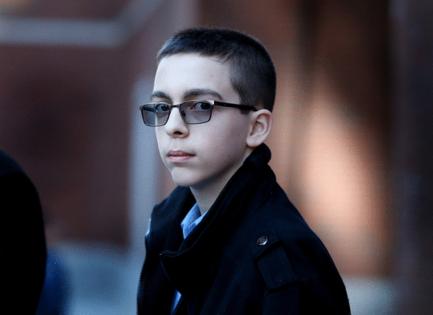Supreme Court denies student's right to wear 'only two genders' T-shirt at school
Published in Political News
WASHINGTON — The Supreme Court on Tuesday turned down a middle-school student's claim he had a free-speech right to wear a T-shirt stating there are "only two genders."
Over two dissents, the justices let stand a ruling that said a school may enforce a dress code to protect students from "hate speech" or bullying.
After three months of internal debate, the justices decided they would not take up another conservative, culture war challenge to progressive policies that protect LGBTQ+ youth.
Justice Samuel A. Alito Jr. filed a 14-page dissent joined only by Justice Clarence Thomas. He said the case "presented an issue of great importance for our nation's youth: whether public schools may suppress student speech because it expresses a viewpoint the schools disfavor."
Liam Morrison, a 7th grader from Massachusetts, said he was responding to his school's promotion of Pride Month when students were encouraged to wear rainbow colors and posters urged them to "rise up to protect trans and gender non-confirming students."
Two years ago, he went to school wearing a black T-shirt that said "There are only two genders."
A teacher reported him to the principal who sent him home to change his shirt. A few weeks later, he returned with the word "censored" taped over the words "two genders" but was sent home again.
The T-shirt dispute asked the Supreme Court to decide whether school officials may limit the free expression of some students to protect others from messages they may see as offensive or hurtful.
In March, the court voted to hear a free-speech challenge to laws in California and 21 other states that forbid licensed counselors from using "conversion therapy" with minors.
That case, like the one on school T-shirts, arose from appeals by the Alliance Defending Freedom, a Christian legal group. It has already won free-speech rulings that allowed a cake maker and a website designer to refuse to participate in same-sex weddings despite state laws that barred discrimination based on sexual orientation.
On April 22, the court sounded ready to rule for religious parents in Montgomery County, Md., who seek the right to have their young elementary children "opt out" of the classroom use of a new "LGBTQ-inclusive" storybooks.
The T-shirt case came before the court shortly after President Donald Trump's executive order declaring the U.S. government will "recognize two sexes, male and female," not "an ever-shifting concept of self-assessed gender identity."
While the Supreme Court has yet to rule on T-shirts and the 1st Amendment, lower courts have upheld limits imposed by schools.
In 2006, the 9th Circuit Court in a 2-1 decision upheld school officials at Poway High School in San Diego who barred a student from wearing a T-shirt that said "Homosexuality is shameful." The appeals court said students are free to speak on controversial matters, but they are not free to make "derogatory and injurious remarks directed at students' minority status such as race, religion and sexual orientation."
Other courts have ruled schools may prohibit a student from wearing a Confederate flag on a T-shirt.
In the new case from Massachusetts, the boy's father said his son's T-shirt message was not "directed at any particular person" but dealt with a "hot political topic."
In their defense, school officials pointed to their policy against "bullying" and a dress code that says "clothing must not state, imply, or depict hate speech or imagery that target groups based on race, ethnicity, gender, sexual orientation, gender identity, religious affiliation, or any other classification."
Lawyers for the ADF sued on the student's behalf and argued the school violated his rights under the 1st Amendment. They lost before a federal judge in Boston who ruled for school officials and said the T-shirt "invaded the rights of the other students..to a safe and secure educational environment."
The 1st Circuit Court agreed as well, noting that schools may limit free expression of students if they fear a particular message will cause a disruption or "poison the atmosphere" at school.
The Supreme Court's most famous ruling on student rights arose during the Vietnam War. In 1969, the Warren Court ruled for high school students who wore black arm bands as a protest.
In Tinker vs. Des Moines, the court said students do not "shed their constitutional rights to freedom of speech or expression at the schoolhouse gate....For school officials to justify prohibition of a particular expression of opinion, [they] must be able to show that its action was caused by something more than a mere desire to avoid the discomfort and unpleasantness that always accompany an unpopular viewpoint."
The justices said then a symbolic protest should be permitted so long as it did not cause a "substantial disruption of or material interference with school activities."
The attorneys for Liam Morrison contended he should win under that standard.
"This case isn't about T-shirts. It's about public school telling a middle-schooler that he isn't allowed to express a view that it differs from their own," said David Cortman, an ADF attorney in the case of L.M vs. Town of Middleborough.
©2025 Los Angeles Times. Visit at latimes.com. Distributed by Tribune Content Agency, LLC.

























































Comments